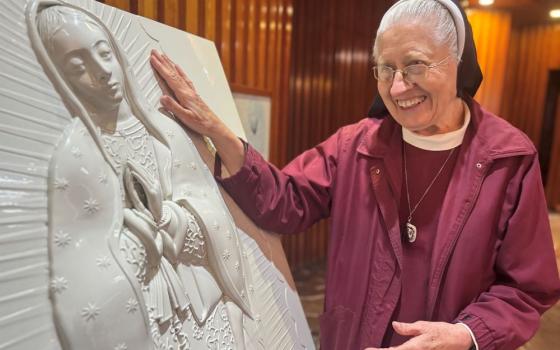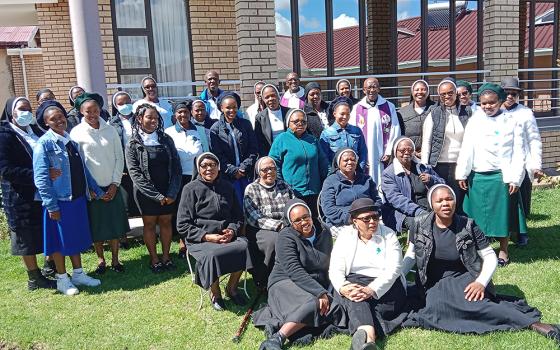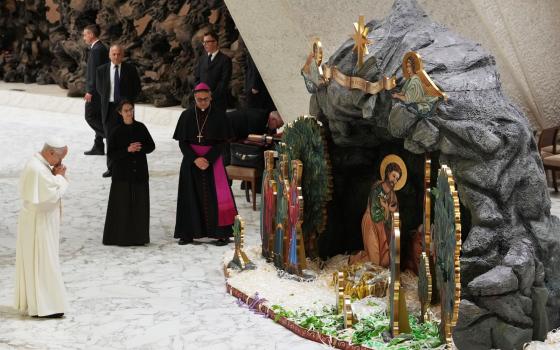Sr. Lydia Agba and students at the Women’s Empowerment Center display clothes they knitted. (GSR photo/Valentine Benjamin)
When 20-year-old Patricia Agah enrolled in Sisters, Home Visitors of Mary's skill acquisition program in September last year, she had clear goals — to learn a new skill of knitting yarns into modern fashionable clothing, to finance her university education and to help her low-income family.
As the firstborn child, she believes that liberating her family from financial despair rests on her shoulders. She lost her father when she was 11.
"I enrolled here last year to learn how to knit yarns into fashionable wares," she said, noting that it's a project not common in Gboko, a town in the Benue State of north-central Nigeria. "I have learned a substantial part of the work. This will help me cope with bills when I finally get into the university to further my education and support my family financially."
"I hope to transfer the knowledge I have acquired to young girls around me, but only those who show enthusiasm for the job. I can knit skirts, jackets, trousers, cardigans and pullovers, depending on customer's demand, and I make them so well," Agah continued.
Patricia Agah operates a knitting machine at the Women’s Empowerment Center run by Sisters, Home Visitors of Mary, in Gboko Diocese of Nigeria. (GSR photo/Valentine Benjamin)
For her, the craft is refreshing and fulfilling, especially with the money that comes with it.
"It's like a money-spinning venture," Agah said. "I was 19 years old when I enrolled last year, and now I am 20 and can say that I am an entrepreneur."
"I hope to set up my business and have a large pool of clients contracting me to produce clothes for them," Agah told GSR.
Sr. Lydia Agba, a Sister of the Home Visitors of Mary congregation at Our Lady Queen of Nigeria parish in the Catholic Archdiocese of Abuja, works in the Gboko Diocese running a female-focused campaign aimed at strengthening women's empowerment and accelerating gender equality in the country.
The program focuses on knitting projects to alleviate women's poverty and empower women, especially widows, school dropouts, people living with AIDS and young mothers .
The Home Visitors of Mary sisters founded the Sr. Mary Schutz Empowerment Center for Youth and Women in 2010. There women learn to run a life-enhancing micro business from home.
Sr. Lydia Agba is coordinator of the Women’s Empowerment Center run by Sisters, Home Visitors of Mary, located in the Gboko Diocese of Nigeria. (GSR photo/Valentine Benjamin)
Agba's first experience with women came when she was posted to work in a school apostolate — a rural mission in the Kafanchan Diocese. That mission turned on the switch for her to start the program to build women's economic capacity.
"I noticed the rate at which women ran to me and other nuns to solicit for help, especially food supplies to support their homes. It really touched me, and I kept asking myself how long one can keep giving them, instead of empowering them," she said.
After her mission in Kafanchan ended, she was posted to another school apostolate facing a similar challenge of poverty affecting women. She met a woman who was running a small knitting program and enrolled.
"After a month of training, I asked my superior to assist me to start a knitting project that could alleviate women's poverty rate. That was how the congregation's knitting project began in 2010," Agba told GSR.
The West African nation of more than 213 million people has made some progress toward bridging the gender gap in recent years. However, women in the country still face childhood marriage, physical and sexual violence, and barriers to economic independence.
Women make up about 49% of Nigeria's population, and their representation in government remains abysmally low, but a high percentage still experiences significant gender gaps. The country's seemingly innocuous Gender and Equal Opportunity Bill proposing a gender equality law favoring women has languished in the parliament for years.
Anita Nyamdio looks at the knitting machine hanger to ensure accuracy at the Women's Empowerment Center, run by Sisters, Home Visitors of Mary, in Gboko Diocese of Nigeria. (GSR photo/Valentine Benjamin)
Despite efforts to support their economic advancement, women still earn less than men, and their chances of rising above the poverty line are far slimmer than men's.
Agba says gender inequality remains a critical challenge in militating against women's empowerment.
"This is why it's important to train and empower women and young people and those who are struggling for survival, especially young girls because when you fail to empower them, you are leaving them to the wings of men who would exploit them for personal gains and that will rub off on the society."
Knitting is an ancient craft that dates back centuries and may be done by hand or machine.
Agba says the art is still alien to the people of Gboko, giving her an edge in breaking into the market with different designs.
Knitted cardigans for school children are ready to be distributed. (GSR photo/Valentine Benjamin)
"The market is not so big but demanding," she said. "We are getting a lot of demand because every school wants their students to have sweaters made from yarn. When we started last year, it became almost too much for us to handle. People are gradually identifying with us because they see that the market is not a competitive one."
Most requests come from schools for sweaters for their students to keep them warm during the rainy and cold seasons. Still, a few requests for baby wear, cardigans and pullovers, adult jackets, skirts, and trousers come from other individuals. Parents who visit nearby maternity hospitals also patronize the business.
"We produce based on individual need and requested style. We make skirts, long sleeves and short sleeves. We also do sportswear because when the weather is very cold, you'd need something that keeps you warm while you are doing your exercise," Agba told GSR.
So far, the project has helped eight women become trained artisans in knitting. But its efforts in scaling are hampered by the unavailability of a constant power supply for heavy-duty equipment like knitting and sewing machines.
Advertisement
When the project started in 2010, it received a $10,000 grant from Conrad N. Hilton Foundation, an American non-profit charitable foundation. (Global Sisters Report is also funded by Conrad N. Hilton Foundation.) The grant was used to rent a space and purchase 10 knitting machines, eight cartons of yarn, tables, chairs and two sewing machines. It's the only funding support the program has received so far.
But despite these challenges, Agba is determined to sustain the project to help economically disadvantaged Nigerians make a meaningful living.
"We named the project after our foundress, Sr. Mary Schutz Empowerment Center for Youth and Women. She had a passion for rehabilitating and empowering youths," she said. "So, my aim is to see that girls are empowered economically so she can stand out in society and build her own empire of business, be self-reliant and confident."





